2013人教版新目标八年级上册Unit2_How_often_do_you_exercise_Section_A课件
2013年八年级英语上册_Unit_2_How_often_do_you_exercise_Section_B_3a-3c写作课件_(新版)人教新目标版
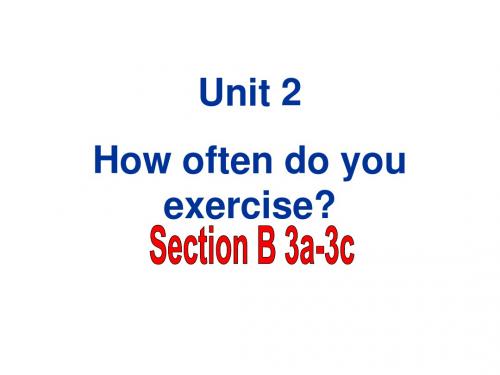
4. He is talking to his father.
(用usually改写句子) usually _____ talks to his father. He _______ 5. My father often reads newspaper
after supper.(画线提问) What _____ does _____ your father often ____ do _____ after supper?
Healthy/unhealthy lifestyle?
Lisa sleeps eight hours every night. She eats a good breakfast and she exercises every day. She never eats junk food.
读一读, 判断谁的生活 健康?
Healthy/unhealthy lifestyle?
Pam likes to watch TV. On weekends, she never exercises and she doesn’t like fruit or vegetables. She eats junk food. And Pam never goes to the doctor.
C. for; healthy
D. for; health
3. — _______ A do you go skating? — Every day.
A. How often
every day.
B. How many C. When
B exercise 4. Most students in my class ____
Write a report about your good and bad habits. Say how often you do things. Use the report in 3a as an example.
人教新目标八年级英语上册思维导图课堂笔记Unit2Howoftendoyouexercise

⼈教新⽬标⼋年级英语上册思维导图课堂笔记Unit2HowoftendoyouexerciseUnit 2 How often do you exercise?2013版⼈教新⽬标⼋年级英语上册思维导图课堂笔记1. housework n. 家务劳动;家务事We should help our mothers do the housework. 我们应该帮助妈妈做家务。
不可数名词do the housework做家务homework家庭作业homework家庭作业workhouse劳动救济所schoolwork课堂作业workplace⼯作场所workhorse吃苦耐劳的⼈workbook练习册2. hardly adv. ⼏乎不;⼏乎没有There’s hardly any tea left. 没有剩下什么茶。
表否定,改反意疑问句时,疑问部分⽤肯定形式This boy hardly eats junk food,does he?=almost nothardadv.努⼒地;艰难地adj.困难的3. ever adv. 在任何时候;从来;曾经Don’t you ever get tired? 难道你从来不累吗?hardly ever⼏乎从不ever since⾃从常⽤于疑问句和否定句中neveradv.从不,从来没有4. once adv. ⼀次,曾经The farmers here sow once a year. 这⾥的农民⼀年播种⼀次。
once a week⼀周⼀次意为“曾经”时,常与过去时连⽤。
位于⾏为动词之前、系动词之后。
He once lived in Hangzhou.This book was famous once,but now nobody reads it.5. twice adv. 两次,两倍I go shopping twice a week. 我⼀个星期购物两次。
Cats sleep twice as much as people. 猫睡觉的时间是⼈的两倍。
人教新目标版英语八上Unit2《Howoftendoyouexercise》(Period1)说课稿

人教新目标版英语八上Unit 2《How often do you exercise》(Period 1)说课稿一. 教材分析人教新目标版英语八上Unit 2《How often do you exercise》(Period 1)的主要内容是围绕频率副词和一般现在时进行学习和交流。
本节课的主要目的是让学生能够熟练运用频率副词和一般现在时进行日常交流,同时提高他们的听说读写能力。
本节课的主要内容包括三个部分:课文阅读,听力练习和口语练习。
课文阅读部分主要介绍了频率副词和一般现在时的基本用法,听力练习部分通过听对话来提高学生的听力理解能力,口语练习部分通过角色扮演和小组讨论来提高学生的口语表达能力。
二. 学情分析根据我对所教班级学生的了解,他们的英语水平普遍较好,对于频率副词和一般现在时的基本用法已经有了一定的了解。
但是,他们在口语表达和听力理解方面还存在一些问题。
因此,在教学过程中,我需要注重培养他们的口语表达能力和听力理解能力。
三. 说教学目标根据教材内容和学情分析,本节课的教学目标如下:1.能够熟练运用频率副词和一般现在时进行日常交流。
2.提高学生的听说读写能力,尤其是口语表达能力和听力理解能力。
3.培养学生的团队合作意识和跨文化交际能力。
四. 说教学重难点本节课的教学重难点如下:1.频率副词的运用。
2.一般现在时的构成和用法。
3.听力理解能力的提高。
4.口语表达能力的培养。
五. 说教学方法与手段为了达到本节课的教学目标,我采用了以下教学方法和手段:1.任务型教学法:通过设计各种任务,让学生在实践中学习和运用语言。
2.交际法:通过模拟真实场景,让学生在交流中学习和提高语言能力。
3.听力教学法:通过听力练习,提高学生的听力理解能力。
4.信息技术辅助教学:利用多媒体课件和网络资源,提高课堂教学效果。
六. 说教学过程本节课的教学过程分为以下几个环节:1.导入:通过播放一段关于运动的视频,引起学生的兴趣,并导入本节课的主题。
2013 八年级上 Unit_2_How_often_do_you_exercise_Section_B

Healthy / unhealthy lifestyle?
Lisa sleeps eight hours every night. She eats a good breakfast and she exercises every day. She never eats junk food.
Healthy / unhealthy lifestyle?
4 SURVEY
Add five questions to the survey on page 81. Then ask three classmates the questions and take notes. Discuss and decide: Who is the healthiest student?
Pam likes watching TV. On weekends, she never exercises and she doesn’t like fruits or vegetables. She eats junk food. And Pam never goes to the doctor.
hardly ever
sometimes never nine
3. eat fruit
4. sleep 5. drink milk 6. eat junk food
7. drink coffee
never two or three three or four times a week times a week four times never a day
How are your eating habits?
activities Eat vegetables Eat fruit Drink milk Eat junk food Drink coffee Every Three or Once or day four times twice a a week week never
人教版新目标版八年级英语上册-Unit-2-How-often-do-you-exercise教案
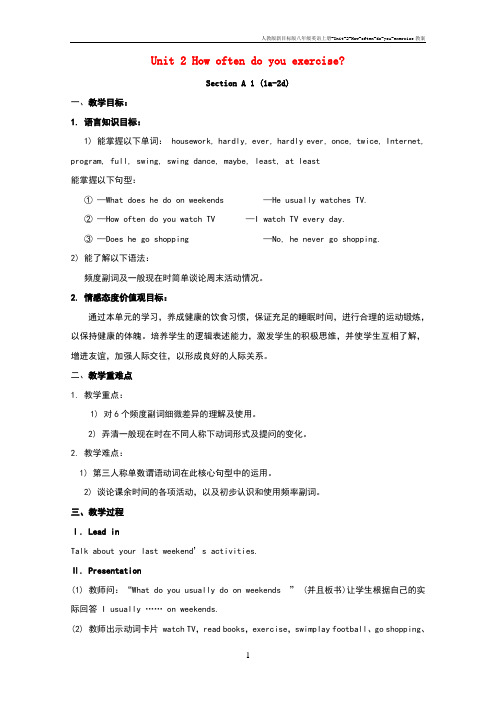
Unit 2 How often do you exercise?Section A 1 (1a-2d)一、教学目标:1. 语言知识目标:1) 能掌握以下单词: housework, hardly, ever, hardly ever, once, twice, Internet, program, full, swing, swing dance, maybe, least, at least能掌握以下句型:① —What does he do on weekends —He usually watches TV.② —How often do you watch TV —I watch TV every day.③ —Does he go shopping —No, he never go shopping.2) 能了解以下语法:频度副词及一般现在时简单谈论周末活动情况。
2. 情感态度价值观目标:通过本单元的学习,养成健康的饮食习惯,保证充足的睡眠时间,进行合理的运动锻炼,以保持健康的体魄。
培养学生的逻辑表述能力,激发学生的积极思维,并使学生互相了解,增进友谊,加强人际交往,以形成良好的人际关系。
二、教学重难点1. 教学重点:1) 对6个频度副词细微差异的理解及使用。
2) 弄清一般现在时在不同人称下动词形式及提问的变化。
2. 教学难点:1) 第三人称单数谓语动词在此核心句型中的运用。
2) 谈论课余时间的各项活动,以及初步认识和使用频率副词。
三、教学过程Ⅰ. Lead inTalk about your last weekend’s activities.Ⅱ. Presentation(1) 教师问:“What do you usually do on weekends ” (并且板书)让学生根据自己的实际回答I usually …… on weekends.(2) 教师出示动词卡片 watch TV,read books,exercise,swimplay football、go shopping、go to movies让学生回答。
人教版新目标版八年级英语上册 Unit 2 How often do you exercise?第三课时教案

Unit 2 How often do you exercise教学目标:一、知识目标学习识记:二、能力目标:培养学生的阅读能力及运用一般现在时熟练表达的能力。
三、语法难点:how often 的用法教学过程:Step1课堂热身和复习(Warming- up and revision)Ste p2 Revise the part of last class.Free time activities , fifteen percent, go online, be surprised that , th e other ten percent, at least , the answer to, it is g ood to relax by using the Internet …Step 3、Finish SectionB 2cRead the article again and answer the questions.The teacher give them some time to discuss the questions. The n ask and answ er in pairs . Finally check the ansers.Step 4、Complete 2dAccording to the article and the pie charts ,write sentences with the perc entag es using always , usually ,or sometimes.Students write the sentences.R ead in groups to correct.Step5: 3aFill in he blanks according to the pictures.The keys: everyday, often, hardly ever, usually, sometime, hardly ever ,neverStep 6 WritingWrite a report about your goo d and bad habits . Say how of ten you do things. Use the report in 3a as an example.Write by themselves1.Read in class.Step7 Self-check1.C omplete the chart with activities you do and don’t do. What about yourmother / father?Fi rst finish, then check.plete the conversation.The keys: usually , How often, hardly ,How often, every, always.St ep8: Test一、用词的适当形式填空。
新目标英语8年级上册1-5单元知识点
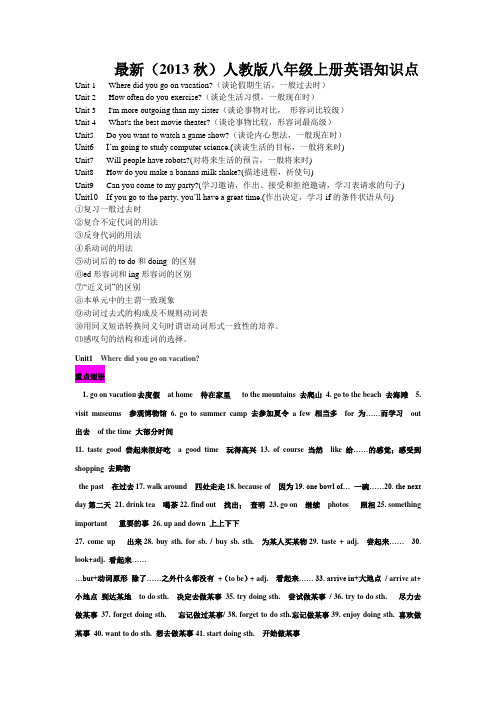
最新(2013秋)人教版八年级上册英语知识点Unit 1 Where did you go on vacation?(谈论假期生活,一般过去时)Unit 2 How often do you exercise?(谈论生活习惯,一般现在时)Unit 3 I'm more outgoing than my sister(谈论事物对比,形容词比较级)Unit 4 What's the best movie theater?(谈论事物比较,形容词最高级)Unit5 Do you want to watch a game show?(谈论内心想法,一般现在时)Unit6 I’m going to study computer science.(谈谈生活的目标,一般将来时)Unit7 Will people have robots?(对将来生活的预言,一般将来时)Unit8 How do you make a banana milk shake?(描述进程,祈使句)Unit9 Can you come to my party?(学习邀请,作出、接受和拒绝邀请,学习表请求的句子) Unit10 If you go to the party, you’ll have a great time.(作出决定,学习if的条件状语从句)①复习一般过去时②复合不定代词的用法③反身代词的用法④系动词的用法⑤动词后的to do和doing 的区别⑥ed形容词和ing形容词的区别⑦“近义词”的区别⑧本单元中的主谓一致现象⑨动词过去式的构成及不规则动词表⑩用同义短语转换同义句时谓语动词形式一致性的培养。
⑾感叹句的结构和连词的选择。
Unit1 Where did you go on vacation?重点短语1. go on vacation去度假at home 待在家里to the mountains 去爬山4. go to the beach 去海滩 5. visit museums 参观博物馆6. go to summer camp 去参加夏令a few 相当多for 为……而学习out 出去of the time 大部分时间11. taste good 尝起来很好吃 a good time 玩得高兴13. of course 当然like 给……的感觉;感受到shopping 去购物the past 在过去17. walk around 四处走走18. because of 因为19. one bowl of… 一碗……20. the next day第二天21. drink tea 喝茶22. find out 找出;查明23. go on 继续photos 照相25. something important 重要的事26. up and down 上上下下27. come up 出来28. buy sth. for sb. / buy sb. sth. 为某人买某物29. taste + adj. 尝起来…… 30. look+adj. 看起来………but+动词原形除了……之外什么都没有+(to be)+ adj. 看起来…… 33. arrive in+大地点/ arrive at+小地点到达某地to do sth. 决定去做某事35. try doing sth. 尝试做某事/ 36. try to do sth. 尽力去做某事37. forget doing sth. 忘记做过某事/ 38. forget to do sth.忘记做某事39. enjoy doing sth. 喜欢做某事40. want to do sth. 想去做某事41. start doing sth. 开始做某事42. stop doing sth. 停止做某事43. have a good time=enjoy oneself=have fun(doing sth.)玩得痛快44. keep doing sth. 继续做某事45. Why not do. sth.? 为什么不做……呢46. so+adj.+that+从句如此……以至于…… 47. tell sb. (not) to do sth. 告诉某人(不要)做某事三、重点句子:1. Where did you go on vacation? 你去哪儿度假的?2. Long time no see. 好久不见。
人教版英语八年级上册《Unit2:How-often-do-you-exercise》说课稿

Unit 2 How often do you exercise (Go for it )讲课稿一、教课背景剖析(一)教课内容剖析本单元的中心话题是exercise.主要语言功能项目是Talk about how often people do things.以活动为主线,环绕着讨论活动频次等语言功能项目睁开了一系列任务活动。
教材内容从基本语言知识到语言综合运用层层递进,听闻读写依次睁开,以一种顺序渐进的生活化的学习程序,指引学生在做事中有目的地学习语言。
(二)教课目的《新课程标准》之基础教育阶段英语课程的整体目标是培育学生综合语言运用能力,而这类综合语言运用能力的形成是成立在语言知识、语言技术、感情态度、学习策略和文化意识的整体发展基础上的,依据本课教课内容和学生知识结构及认知特色,本单元的教课目的确立为:1、语言知识目标:掌握讨论运动以及表述做某件事情的词汇和语言构造。
2、语言技术目标:经过学习本课,学生能够用英语相互议论课余时间的活动安排。
3、感情态度目标:(1)经过情形的设置和活动的睁开,指引学生在体验、实践、参加、合作和沟通中,踊跃主动地学习语言,领会在做事中学习英语的愉悦。
(2),培育学生学习英语的激烈兴趣,乐于参加各样活动的踊跃感情,倡导健康生活方式。
4、学习策略目标:(1)Disscussion.经过小组议论、睁开检查等研究,明确在用中学、沟通中学习的想法。
(2)Classifying.经过分类法,可简化学习过程,利于记忆。
(3)Guessing.经过猜想,并勇敢讲话,以学习新知。
5、文化意识目标:认识不一样的生活方式以及表示频次的一些常用表达法(三)教课要点和难点教课要点:使学生娴熟掌握运用Hoe often...?问句咨询别人的活动并能对别人的咨询做出正确回答,使学生学会运用I often....句型讨论自己的活动,并且能进行实质社交。
为了突出要点,每一个环节都要以教课要点为依靠,环绕着讨论课余生活展开丰富的训练,并采纳实物和多媒体等教课手段,运用大批的动画设计,使学生在一种生动开朗传神的氛围中获取信息掌握知识。
八年级英语上册Unit2Howoftendoyouexercise第3课时教案(新版)人教新目标版

4. 鼓励学生主动参与课堂活动,增加实践机会。
四、教学方法与手段
教学方法:
1. 任务驱动法:通过设计具有实际意义的任务,让学生在完成任务的过程中运用所学知识,提高语言实际运用能力。
2. 情境教学法:创设真实的语言环境,让学生在特定的情境中学习英语,增强学习兴趣和积极性。
5. 编写一个关于你所在城市的交通状况的句子,使用一般现在时态。例如:“Traffic in my city is usually heavy in the morning and evening.”
作业要求:
- 每个句子都要使用一般现在时态。
- 句子内容要真实、有意义,尽量避免使用中文。
- 作业完成后,学生需自行检查语法和拼写错误。
八年级英语上册 Unit 2 How often do you exercise第3课时教案 (新版)人教新目标版
课题:
科目:
班级:
课时:计划1课时
教师:
单位:
一、教学内容
本节课为人教新目标版八年级英语上册Unit 2 How often do you exercise的第三课时。本课时主要内容为Section B 3a-3c。本节课主要让学生掌握一般现在时态的疑问句和回答方式,以及频率副词的运用。通过本节课的学习,学生能够更好地运用一般现在时态描述自己的生活习惯,提高英语口语表达能力。
3. 编写一个关于你家人日常运动的句子,使用一般现在时态。例如:“My mother often does yoga in the evening.”
4. 编写一个关于你同学日常运动的句子,使用一般现在时态。例如:“My classmate never misses the school sports meeting.”
新目标八年级上册Unit2 How often do you exercise知识讲解及练习

Unit2 How often do you exercise?一、重点短语help with housework 帮助做家务 on weekends 在周末how often 多久一次 hardly ever 几乎从不once a week 每周一次 twice a month 每月两次be free 有空 go to the movies 去看电影use the Internet 用互联网 swing dance 摇摆舞play tennis 打网球 stay up late 熬夜;睡得很晚go to bed early 早点睡觉 play sports 进行体育活动be good for 对……有好处 go camping 去野营not…at all 一点儿也不…… in one’s free time 在某人的业余时间the most popular 最受欢迎的 such as 比如;诸如old habits die hard 积习难改 go to the dentist 去看牙医more than 多于;超过 less than 少于at least 至少 have dance and piano lessons 上舞蹈课和钢琴课二、句型荟萃help sb. with sth. 帮助某人做某事How about…? ......怎么样?/ ……好不好?want sb. to do sth. 想让某人做某事How many+可数名词复数+一般疑问句?…有多少…?主+find+ that从句. ……发现……spend time with sb. 和某人一起度过时光It’s+ adj.+ to do sth. 做某事是……的。
ask sb. about sth. 向某人询问某事by doing sth. 通过做某事What’s your favorite……? 你最喜爱的…是什么?the best way to do sth. 做某事的最好方式三、单元语法频度副词1.频度副词:表示动作发生间隔(既频率)的副词。
人教新目标版八年级上册Unit2 How often do you exercise第一课时全英文说课稿
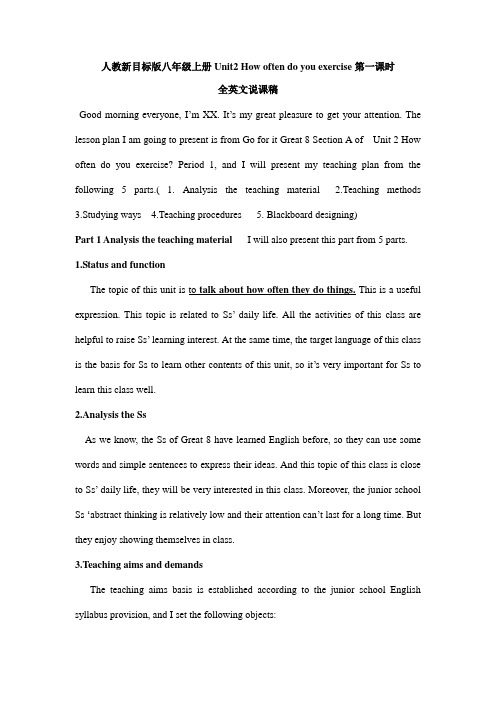
人教新目标版八年级上册Unit2 How often do you exercise第一课时全英文说课稿Good morning everyone, I’m XX. It’s my great pleasure to get your attention. The lesson plan I am going to present is from Go for it Great 8 Section A of Unit 2 How often do you exercise? Period 1, and I will present my teaching plan from the following 5 parts.( 1. Analysis the teaching material 2.Teaching methods 3.Studying ways 4.Teaching procedures 5. Blackboard designing)Part 1 Analysis the teaching material I will also present this part from 5 parts. 1.Status and functionThe topic of this unit is to talk about how often they do things. This is a useful expression. This topic is related to Ss’daily life. All the activities of this class are helpful to raise Ss’ learning interest. At the same time, the target language of this class is the basis for Ss to learn other contents of this unit, so it’s very important for Ss to learn this class well.2.Analysis the SsAs we know, the Ss of Great 8 have learned English before, so they can use some words and simple sentences to express their ideas. And this topic of this class is close to Ss’ daily life, they will be very interested in this class. Moreover, the junior school Ss ‘abstract thinking is relatively low and their attention can’t last for a long time. But they enjoy showing themselves in class.3.Teaching aims and demandsThe teaching aims basis is established according to the junior school English syllabus provision, and I set the following objects:1.Knowledge objects: To enable the Ss master the key vocabularies and phrases: housework, How often, hardly everTo make the Ss understand and use the target language: How often do you do sth.? I often.What do you usually do on weekends?To let Ss master the Adverb of frequency2. Ability objects: To develop the Ss’abilities of listening, speaking, reading and writing,To train the Ss’abilities of shorthand, communicating, thinking and summarizing.3.Moral objects: To make the Ss learn how to work with others and express ideas during the communicatingTo make the Ss have the feeling of successful and achievement.4.Teaching key and difficult points:To make the Ss express the daily activities with the target language and adverbs of frequency.5.Teaching aids:In this class, I mainly use: multi-media computer, tape recorder, music, flashing cards,school things and so on. They will be needed in this class.Part2 Teaching methods:In this class, I mainly use: Communicative teaching method; task-based teaching method; game teaching method; cooperative teaching method ”As we know, the main instructional aims of Ss in junior school is to cultivate their abilities of listening ,speaking, reading, writing and their good sense of English language. So I will use these methods, That’s to say, I will let the Ss have a better understanding of target language. I will give the Ss some tasks and arrange some activities to have my class.Part3 Studying waysIn this class, to make the Ss master the key vocabularies and phrases by guessing, acting, listening and using.To make the Ss learn the English language by communicating, using, and listeningTo enable the Ss master the target language by summarizing, using and doing some exercises.Some Ss are lack of courage and independent thinking ability, So I will be a guider, Many activities require all the Ss to take part in , they will have many chances to practice their English. They will do some pairwork or groupwork to learn how ro communicate and exchange information with others.Part4.Teaching procedures Let’s focus on the teaching procedures which include 7 steps.Step 1. Warming up ( 2 minutes )Enjoy a English song“Where are you going?”The purpose of my designing : to attract the Ss’attention and form the relaxing learning surrounding, Stimulate the Ss’ learning interest and let them be ready for the class.Step2:Revision Free talkingT: Did you have a good summer vacation? S: Yes, of course.T: What did you do in your summer vacation. S: I went swimming.The purpose of my designing: To make the Ss feel easy at the beginning, and they review the phrasal verbs they have learned before. Also this part is helpful to learn the new lesson.Step3:presentation1.T:Well, you all did so many things in you summer vacation. How about your weekends? What do you usually do on weekends?I usually do some reading on weekend. How about you, boys and girls?S: I often watch TV on weekend.T: Very good. Others ?(Teacher will ask and Ss answer what they do again and again until the Ss understand and use them well)2.Teacher provides some pictures on the screen and ask “What does he/she do on weekends?”and the Ss answer them according to the pictures.The purpose of my designing :To consolidate the target language and the pictures can stimulate Ss’ learning interest. It also develop the Ss’ listening and speaking skills.3.T:Well, I usually exercise in my free time. Do you like exercising? Do you usually exercise in you free time? S: Yes.T: I think health is the most important thing in my life, so I exercise three times in a week.How many times do you exercise in a week? S: Once.Present the sentences pattern : How often do you do sth.?And adverbs of frequency: always, usually, often, sometimes, hardly ever,never and once/ twice/ three times a week/ a monthThe purpose of my designing:To make the Ss master the new words quickly and correctly, at this moment, I give the Ss the sentence pattern.Step4: Practice (pair work)T: Now, boys and girls. Work in pairs and talk about what you usually do in your free time and how often you do it. The purpose of my designing:This activity provides Ss a good chance to use English freely. It not only helps the Ss master the target language but also can help them learn from each other. It will train Ss’ listening, speaking skills and improve their ability of working with others.Step5 ListeningThe teacher input more target language including words and sentences by listening to the tapes. Ss listen to 1b and then check the answers. Then Ss listen to 1b again and repeat. Let the Ss listen and imitate the conversation, pay attention to their pronunciation and intonation.The purpose of my designing:This step can develop their listening skills and consolidate the target language.Step6 WritingIn this step, teacher will ask the Ss to do a survey in their group about how often they do things, and then write a short report , show it in class them.The purpose of my designing:This activity provides Ss a good chance to use English freely. They can finish the survey and writing according to their thoughts byusing the target language.At the same time, It trains their speaking, writing skills. Step7 Summary and HomeworkThe purpose of my designing: I think Ss should master the knowledge in class, so I’ll give Ss 1or 2 minutes to summary. If they have questions, I will help them solve. Also homework is so important that the Ss should speak English as much as they can in class or after class. It’s necessary for Ss to do some extensive exercises after class to consolidate the knowledge they learned.Part5 Blackboard designing。
人教新目标版英语八上Unit2《Howoftendoyouexercise》精美说课稿

人教新目标版英语八上Unit 2《How often do you exercise》精美说课稿一. 教材分析人教新目标版英语八上Unit 2《How often do you exercise》主要讨论了关于频率疑问词how often的用法。
本课通过引入一个关于学生锻炼习惯的对话,让学生学会询问和回答关于频率的问题。
教材内容丰富,贴近学生生活,能够激发学生的学习兴趣。
二. 学情分析学生在学习本课之前,已经掌握了基本的日常交际用语,对频率疑问词how often有所了解。
但部分学生可能在实际运用中还存在一定的困难,如在口语交流中正确使用频率疑问词,以及对答如流。
因此,在教学过程中,需要关注学生的个体差异,因材施教。
三. 说教学目标1.知识目标:学生能够掌握频率疑问词how often的用法,正确询问和回答关于频率的问题。
2.能力目标:学生能够在实际情境中运用频率疑问词进行日常交际,提高口语表达能力。
3.情感目标:培养学生养成良好的锻炼习惯,关注身心健康。
四. 说教学重难点1.重点:频率疑问词how often的用法。
2.难点:在实际情境中正确运用频率疑问词进行日常交际。
五. 说教学方法与手段1.情境教学法:通过设定各种生活场景,让学生在实际情境中练习使用频率疑问词。
2.交际法:引导学生进行角色扮演、小组讨论等互动活动,提高口语表达能力。
3.任务型教学法:设计各种任务,让学生在完成任务的过程中,巩固所学知识。
六. 说教学过程1.导入:以一幅关于学生锻炼的图片导入新课,激发学生的学习兴趣。
2.新课呈现:教师展示一段关于学生锻炼习惯的对话,引导学生关注频率疑问词how often。
3.讲解与练习:教师讲解频率疑问词how often的用法,并通过举例、互动等方式让学生进行实际操练。
4.小组活动:学生分组进行角色扮演,模拟生活场景,运用频率疑问词进行交流。
5.任务型活动:设计一道关于学生锻炼习惯的任务,让学生在完成任务的过程中,巩固所学知识。
八年级上册英语Unit_2_How_often_do_you_exercise知识点总结

Unit 1 How often do you exercise?【知识梳理】I. 重点短语 1. go to the movies=go to the cinema 看电影2. look after=take care of 照顾3. surf the Internet 上网4. healthy lifestyle 健康的生活方式5. go skateboarding 去划板6. (be) in good health =(be)healthy 身体健康7. keep healthy=keep in good health 保持健康8. as for 至于9. take/do exercise=play/ do sports 锻炼,做运动10. eating habits 饮食习惯11. the same as 与……相同12. once a month 一月一次13. be different from 不同14. twice a week 一周两次15. make a difference to 对什么有影响16. how often 多久一次17. although=though 虽然18. most of the students=most students 大多数学生19. activity survey 活动调查20. go shopping=do some shopping 购物21. do homework 做家庭作业22. do housework 做家务事23. junk food 垃圾食物24. be good/bad for 对……有益(害)25. on/at weekends 在周末26. want to do sth=would like to do sth =feel like doing sth 想要做某事27. want sb to do sth = would like sb to do sth 想要某人做某事28. try to do sth 尽量做某事try doing sth. 试着做某try one‟s best to do sth. 尽力做某事29. come home from school 放学回家30. of course=certainly=sure 当然31. get good grades 取得好成绩32. help sb (to)do sth 帮助某人做某事,33. help sb with sth 在某方面帮助某人34. a lot of =lots of=many /much 许多,大量的35.as for 至于;关于36.how many 多少(针对可数名词)37.how much 多少(针对不可数名词)38.of course = sure 当然;确信39.every day 每一天40.every night 每晚41.hardly ever 几乎不42.be good for one's health 有益健康43.try to do sth. 尝试做某事44.kind of 有点II. 重要句型 1 How often do you exercise? 你多久锻炼一次?2 Three to six times a week 每周三到六次3 How long do you sleep every night? 你每天睡几个小时?4.I sleep more than 5 hours every night 多于5小时5. How often do you eat fruit and vegetables? 你多久吃一次水果和蔬菜?6.What do you usually do on weekends?你周末通常做什么?7.I usually play soccer 我通常踢足球8.What is your favorite program?你最喜欢的节目是什么?9.Some students are very active,they exercise every day一些学生非常的活泼,每天都运动.10.As for homework,most students do it every day关于作业,大多数学生每天都做.III. 交际用语询问别人做某事的频繁程度IV. 重要语法频率副词一For about three years.大约三年.(2)how soon意为“多久以后”.多用于将来时间,其答语为in+一段时间.—How soon will your mother come back?你妈妈多久以后回来?一She will be back in ten minutes.她十分钟以后回来.(3)how many times意为“多少次”,它只询问次数,即“多少次”.常用once一次,twice两次,three times三次等回答.一How many times did you get to Beijing?你去北京几次了?—Oh,four times.哦,四次了.(4)how far意为“离……多远”,多用来询问路程.How far is it from your school to your home?你家距离学校有多远?【易混辨析】house, family ,home(1)house一般指所居住的建筑物,即“房子,住宅”.His house was burned in a big fire.他的房子在一场大火中被烧毁了.(2)family着重指家庭成员.My family are au here.我们一家都在这儿.(3)home则指某人出生及生活的环境,包括住处及家人.He left home at the age of 18.他18岁离开了家.4.trytry to do sth.试图做某事,想要做某事try one's best竭尽所能She tries to learn English.她试着去学英语.Jack tries his best to win the game.杰克尽他最大的努力去赢这场比赛.5. a lot of, many, much三者都可表示“许多”,a 10t 0f既可修饰可数名词,也可修饰不可数名词;many修饰可数名词复数;much 修饰不可数名词.We have a lot of friends.---We have many friends.我们有许多朋友.Do you have a lot of money?=Do you have much money?你有许多钱吗?在修饰可数名词复数时,a lot/lots of可与many互换;在修饰不可数名词时,alot/lots of可与much互换.但a lot/lots of一般不用于否定句和疑问句中,在这两类句子中要用many或much.6.kind ofkind of后接形容词或副词,意为“有点,有几分”.He felt kind of tired.他感觉有点累.The like is kind of expensive.那辆自行车有点贵.(1)a kind of+ m一种This kind of question is hard to answer.这种问题很难回答.(2)all kinds《+n.各种各样的There are all kinds of flowers iIl the park.公园里有各种各样的花.(3)different kinds of+n.不同种类的There a地different kinds of animals in the zoo.动物园里有不同种类的动物.7.Maybe ,perhaps, likely possible, probablymaybe. perhaps和probably都有“也许,大概”的意思.perhaps也许,大体和possibly同义;probably大概,肯定的成分较大,是most likely的意思;possibly可能,常和call,may,must等情态动词连用,比probably语气弱得多;maybe或许,比perhaps普通,但不庄重;likely或许,通常与most,very连用.8.although , thoughalthough和though作连词用,意为“尽管,虽然”,二者可以通用.Although/Though they are so poor ,they have enough to eat·他们虽然穷,食物还是够吃的.注意:在一个句子中,用了although或though就不能用but了,用了but则不能用although或though,即:“虽然……但是……”不见面,但是可以用yet.9.hard, hardlyhard既可作形容词,也可作副词,其词义丰富;hardly是具有“几乎没有,几乎不”这种否定含义的独立副词. ms ground is too bard to dig.这块地太硬,挖不动.(adj.)Chinese is hard t0 learn for foreigners.对于外国人来说汉语很难学.(adj.)You should study hard.你应该努力学习.(adv.)There is hardly any coffee left.几乎没剩下什么咖啡了.(adv.)Hardly anybody came.几乎没有什么人来. (adv.)【中考连线】①一Do you have any plans for your summer vacation?一I am ____for London next Sunday.A.going to B.leaving C. will go答案:B点拨:leave for意为“动身去某地”,故选B.②(2009·浙江湖州中考)---___do you visit your uncle?----Once a week, at least.A.How long B.How manyC.How often D .How soon答案:C点拨:本题考查疑问词的用法.由答语“至少一周一次”可知用how often how long “多久”;how m any'…多少”;how soon'…多久”.③(2009·淄博中考)--Would you mind ____my little sister while I‟II away?--Of course not.A.looking for B. looking atC. looking afterD. looking forward to答案:C点拨:由题意“当我不在时,你介意照顾一下我妹妹吗?”知选looking after.④《2009·河北中考)--___can you be ready ,Andy?一In ten minutes. .A.How much B.How oftenC.How long D .How soon答案:D点拨:how much多少.提问不可数名词或价格;How often多久一次;how long多久,多长;how soon多久,用于将来时态.由答语in ten minutes“在l0分钟之后”知选D.1. How often do you shop? 疑问词how的用法(1)怎样,用什么手段,方法/交通工具How are you? / How is she?How did he do it? / I don‟t know how to swim.How do you come to school?(2) 情况如何(指身体健康状况)How are you?(3) how many,how much表示“多少”how many后接可数名词复数,how much接不可数名词。
新版人教版_八年级上Unit_2_how_often_do_you_exercise_Section_A-2a-2d
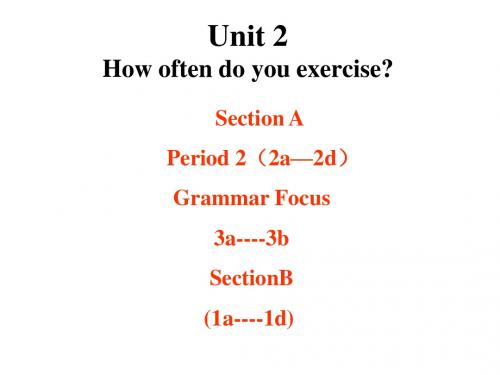
How often do you do these activities?
do homework Every day
A: How often do you do your homework? B: I do my homework every day.
How often do you …? does he / she …?
• every day / night • once a week / month • twice a week / month • three times a week / month • once or twice a week / month 每天/每夜
I surf the Internet… four times a month.
Do you like watching TV? How often do you watch TV? always? —— 100% usually? often? sometimes? hardly ever? never? —— 0%
一周/一个月一次
一周/一个月两次 一周/一个月三次 一周/一个月一 次或两次
“次数”的表达方法
一次 once, 两次 twice,三次或三次以 上用基数词加上 times, three times, five times, one hundred times. 表示“„„几次”的表达方法是:
once a day / a week / a month / a year
usually often
always
sometimes hardly ever never
人教新目标英语八年级上册unit2howoftendoyouexercise教学设计

Unit2How often do you exercise?(Section B)(The first period)一、教学课型:听说课二、教材分析1. 教学内容新目标八年级上册Unit 2 How often do you exercise?( Section B)第一课时。
2. 教学内容分析本节课是本单元Sect ion B的第一课时,它的中心任务是能谈论健康与不健康食物,并运用频率副词谈论自己或他人的生活习惯,引领学生拥有健康的生活方式。
三、教学目标:1.语言知识:1)学习新单词coff ee,hea lth,junk food;复习频率副词。
2)学习谈论健康问题。
3)学习掌握目标语言:How often …2.语言技能:1)学生能灵活使用新学习的词汇及句型。
2)学生能对听力材料进行判断分析,抓住关键词。
3)学生能谈论自己及他人的生活方式。
3.学习策略:学生通过小组活动学会与人合作,通过游戏提高学生学习兴趣,通过谈论健康问题,引领学生拥有健康的生活方式,通过写健康宣言培养学生写作能力。
4.情感态度:学生能通过了解哪些食物是健康食物,哪些食物是不健康食物,懂得通过饮食、锻炼等方式为自己努力营造一个健康的生活方式。
四、教学设计:1. 教材处理及设计思路1)本节课主要要掌握几个名词,并通过复习所学句型,完成听力任务,并进一步讨论现在中学生存在的健康问题。
2)扎实掌握词汇和句型后,再进行听力训练。
3)给学生提供一些材料背景,让学生做调查。
4)最后设计出一个任务,让学生针对自己的生活习惯,提出倡议。
五、教学难点:1.频率副词的使用。
2.给出建议。
六、教学过程:Step I. warming up教师活动:教师让学生观看一段关于老师自己的生活的视频,让学生了解自己的一些生活习惯。
让学生快速记忆一些重要信息,之后要回答老师的问题。
并对老师的生活方式给出更好的建议,可以让老师更健康。
此时小组间竞赛开始。
英语人教版八年级上册_教材目录及单词

2013年新目标英语人教版初二上册八年级英语上册目录UNIT 1 Where did you go on vacation?Unit 2 How often do you exercise?Uuit 3 I'm more outgoing than my sister.Unit 4 What's the best movie theater?Unit 5 Do you want to watch a game show?Unit6 I'm going to study computer science.Unit 7 Will people have robots?Unit 8 How do you make a banana milk shake?Unit 9 Can you come to my party?Unit10 If you go to the party,you 'll have a great time!2013年新目标八年级上册各单元英语单词Unit1 Where did you go on vacation?anyone ['eniwʌn] pron.任何人anywhere ['eniweə(r)] adv.任何地方 n.任何(一个)地方wonderful ['wʌndəfl] adj.精彩的;极好的few [fjuː] adj.很少的;n.少量most [məʊst] adj.最多的;大多数的;something ['sʌmθɪŋ] pron.某事物;nothing(=not…anything) ['nʌθɪŋ] pron.没有什么n.没有myself [maɪ'self] pron.我自己everyone ['evriwʌn] pron.每人;人人yourself [jɔː'self] pron.你自己;你亲自hen [hen] n.母鸡;雌禽bored [bɔːd] adj.无聊的;厌烦的;郁闷的pig n.猪diary ['daɪəri] n.日记;日记簿(keep a diary)seem [siːm] vi.似乎;好像someone ['sʌmwʌn] pron.某人;有人quite a few相当多;不少(后接可数名词)of course [əvkɔːs] 当然activ ity [æk'tɪvəti] n.活动;活跃decide [dɪ'saɪd] v.决定;选定(decide to do sth.)try [traɪ] v.尝试;设法;努力 (try to do sth. /try doing sth.)bird [bɜːd] n.鸟;禽paragliding ['pærəɡlaɪdɪŋ] n.空中滑翔跳伞bicycle ['baɪsɪkl] n.自行车building ['bɪldɪŋ] n.建筑物trader ['treɪdə(r)] n.商人;商船wonder ['wʌndə(r)] v.惊奇;想知道;怀疑difference ['dɪfrəns] n.差异;不同top [tɒp] n.顶部;顶wait [weɪt] v.等;等待(wait for)umbrella [ʌm'brelə] n.伞;雨伞wet [wet] adj.湿的;雨天的below [bɪ'ləʊ] prep.低于;在...下面adv.在下面as [əz] conj.如同;像...一样enough [ɪ'nʌf] adj.足够的adv.足够地;充分地duck [dʌk] n.鸭肉;鸭hungry(反full) ['hʌŋɡri] adj.饥饿的;渴望的feel like(doing sth.)想要dislike [dɪs'laɪk] v.不喜欢;厌恶 n.不喜爱;厌恶;反感Unit2 How often do you exercise? housework ['haʊswɜːk] n.家务劳动hardly ['hɑːdli] adv.几乎不;简直不;刚刚ever ['evə(r)] adv.曾经;在任何时候once [wʌns] adv.一次;曾经twice [twaɪs] adv.两倍;两次Internet ['ɪntənet] n.因特网program ['prəʊɡræm] n.节目;程序;课程;节目单full [fʊl] adj.满的;充满的;完全的swing [swɪŋ] n.摇摆;秋千v.摇摆;旋转maybe ['meɪbi] adv.或许;也许;可能swing dance摇摆舞least [liːst] adj.最小的;最少的at least至少hardly ever很少;几乎从不;难得junk n.垃圾;废旧杂物coffee ['kɒfi] n.咖啡;咖啡色health [helθ] n.健康;人的身体或精神状态result [rɪ'zʌlt] .结果;后果percent [pə'sent] adj.百分之...的online [ˌɒn'laɪn] adj.在线的adv.在线地television ['telɪvɪʒn] n.电视机;电视节目although [ɔːl'ðəʊ] conj.虽然;尽管;然而;可是through [θruː] prep.穿过;凭借;一直到body ['bɒdi] n.身体mind [maɪnd] .头脑;想法;意见;心思such [sʌtʃ] adj.这样的;如此的together [tə'ɡeðə(r)] adv.共同;一起die [daɪ] v.死;枯竭;消失writer ['raɪtə(r)] n.作者;作家dentist ['dentɪst] n.牙科医生magazine ['mæɡəziːn] n.杂志however [haʊ'evə(r)] adv.然而;无论如何;不管多么than [ðən] conj.比almost ['ɔːlməʊst] adv.几乎;差不多none [nʌn] pron.没有人;没有任何东西,毫无less [les] adj.更少的;较少的point [pɔɪnt] n.看法;要点;重点;小数点;目标;分数such as例如;诸如junk food n.垃圾食品;无营养食品more than超过;多于;不仅仅;非常less than不到;少于point n. 得分,点Unit3 I'm more outgoing than my sister. outgoing ['aʊtɡəʊɪŋ] adj.外向的better ['betə(r)] adj.更好的;较好的 adv.更好地loudly ['laʊdli] adv.大声地;高声地;花俏地quietly ['kwaɪətli] adv.安静地;悄悄地;平静地hard-working [hɑːd'wɜːkɪŋ] adj.勤勉的;努力工作的competition [ˌkɒmpə'tɪʃn] n.竞争;比赛fantastic [fæn'tæstɪk] adj.极好的;了不起的which adj.哪一个;哪一些pron.哪一个;哪些clearly ['klɪəli] adv.清楚地;显然地win [wɪn] v.赢;赢得;获胜;获得n.胜利though conj.虽然;尽管;adv.不过care about关心talented ['tæləntɪd] adj.有才能的;有天赋的truly ['truːli] adv.真实地;真诚地;正确地care [keə(r)] v.关心;担忧;照顾;在乎serious ['sɪəriəs] adj.严肃的;严重的;庄重的mirror ['mɪrə(r)] n.镜子;反映necessary ['nesəsəri] adj.必要的;必然的both [bəʊθ] adj.两者都pron.两者should [ʃəd] aux.应该;可能;应当;将要touch [tʌtʃ] vt.触摸;感动reach [riːtʃ] v.到达;伸出;达成;取得联系;延伸;(伸手)去够heart [hɑːt] n.心脏;内心fact [fækt] n.事实;真相;实际break [breɪk] v.打碎;折断;违背;解决;中断laugh [lɑːf] v.发笑;笑;嘲笑 n.笑声;笑;笑料similar ['sɪmələ(r)] adj.类似的share [ʃeə(r)] vt.分享,共享;分配;共有loud [laʊd] adj.大声的;adv.大声地;响亮地primary ['praɪməri] adj.最初的,最早的be different from和...不同information [ˌɪnfə'meɪʃn] n.信息;情报;资料;通知as long as只要bring out拿出;推出the same as与...同样的in fact事实上;实际上;确切地说be similar to类似于;与...相似Unit4 What's the best movie theater?theater ['θɪətə] n.剧场;电影院;戏院comfortable ['kʌmftəbl] adj.舒适的;充裕的seat [siːt] n.座位;screen [skriːn] n.屏幕;银幕close [kləʊs] v.关;合拢;不开放;停业worst [wɜːst] adj.最坏的;最差的cheaply ['tʃiːpli] adv.廉价地;粗俗地song [sɒŋ] n.歌曲;歌唱choose [tʃuːz] v.选择;决定carefully ['keəfəli] adv.小心地,认真地reporter [rɪ'pɔːtə(r)] n.记者fresh [freʃ] adj.新鲜的;清新的comfortably ['kʌmftəbli] adv.舒服地;容易地;充裕地worse [wɜːs] adj.更坏的;更差的service ['sɜːvɪs] n.服务pretty ['prɪti] adv.相当地adj.漂亮的menu ['menjuː] n.菜单act [ækt] v.行动;表演meal [miːl] n.一餐;膳食so far到目前为止;迄今为止no problem没什么;不客气creative [kri'eɪtɪv] adj.创造的,创造性的;performer [pə'fɔːmə(r)] n.表演者;执行者talent ['tælənt] n.天赋;才能,才艺;common ['kɒmən] adj.常见的;共同的;普通的magician [mə'dʒɪʃn] n.魔术师;术士beautifully ['bjuːtɪfli] adv.美丽地;完美地;role [rəʊl] n.作用;角色winner ['wɪnə(r)] n.获胜者prize [praɪz] n.奖品;奖金everybody ['evribɒdi] pron.每人;人人example [ɪɡ'zɑːmpl] n.例子;榜样poor [pɔː(r)] adj.可怜的;贫穷的seriously ['sɪəriəsli] 严重地,严肃地give [ɡɪv] v.给;赠予;送crowded ['kraʊdɪd] adj.拥挤的have…in common有相同特征all kinds of各种各样;各种类型be up to是…….的职责;由…….决定play a role发挥作用;有影响makeup编造for example例如take…seriously认真对待Unit5 Do you want to watch a game show? sitcom ['sɪtkɒm] n.情景喜剧 (= situation comedy) news [njuːz] n.新闻;消息soap [səʊp] n.肥皂;肥皂剧educational [ˌedʒu'keɪʃənl] adj.教育的;有教育意义的plan [plæn] n.计划;方法v.打算;计划hope [həʊp] .希望;期望;盼望n.希望discussion [dɪ'skʌʃn] n.讨论;谈论stand [stænd] v.站立;忍受happen ['hæpən] vi.发生;碰巧;出现;偶遇may [meɪ] aux.可以,能够;可能,也许expect [ɪk'spekt] v.预期;期待;盼望joke [dʒəʊk] n.笑话;玩笑v.说笑话;开玩笑comedy ['kɒmədi] n.喜剧;滑稽;幽默事件find out查明、弄清meaningless ['miːnɪŋləs] adj.无意义的;不重要的action ['ækʃn] n.行为;活动cartoon [kɑː'tuːn] n.卡通;漫画culture ['kʌltʃə(r)] n.栽培;文化;教养famous ['feɪməs] adj.著名的;有名的appear [ə'pɪə(r)] vi.出现;出版;显得become [bɪ'kʌm] v.变成;成为rich [rɪtʃ] adj.富有的;富饶的;丰富的successful [sək'sesfl] adj.成功的;圆满的might [maɪt] aux.可能;也许;may的过去式main [meɪn] adj.主要的;最重要的reason ['riːzn] n.原因;理由film [fɪlm] n.电影unlucky [ʌn'lʌki] adj.倒霉的;不幸的;不吉利的lose [luːz] vt.丢失;失败vi.失败ready ['redi] adj.准备好的;乐意的character ['kærəktə(r)] n.个性;品质;人物;simple ['sɪmpl] adj.简单的;朴素的;单纯的;笨的army ['ɑːmi] n.军队;陆军;一大批action movie动作片be ready to愿意迅速做某事dress up装扮;乔装打扮take sb.’s place代替;替换do a good job工作干得好;做得好Unit6 I'm going to study computer science.doctor ['dɒktə(r)] 医生engineer [endʒɪ'nɪr] 工程师violinist [ˌvaɪə'lɪnɪst] 小提琴手pilot ['paɪlət] 飞行员pianist ['pɪənɪst] 钢琴家scientist ['saɪəntɪst] 科学家college ['kɑːlɪdʒ] 大学education [ˌedʒu'keɪʃn] 教育medicine ['medsn] 药,医学university [ˌjuːnɪ'vɜːrsəti] 大学,高等学府article ['ɑːrtɪkl] 文章,论文send [send] 邮寄,发送grow up长大成长computer programmer计算机管理员be sure about确信make sure确保resolution [ˌrezə'luːʃn] 决心,决定foreign ['fɔːrən] 外国的able [ˌebəl] 能够discuss [dɪˌskʌs] 讨论,商量promise [ˌprɑmɪs] 承诺,诺言beginning [bɪˌɡɪnɪŋ] 开头,开端improve [ɪmˌpruv] 改进,改善physical ['fɪzɪkl] 身体的self-improvement [selfɪmp'ruːvmənt] 自我改进,自我提高hobby ['hɑːbi] 业余爱好own [oʊn] 自己的,本人的,拥有personal ['pɜːrsənl] 个人的,私人的relationship [rɪ'leɪʃnʃɪp] 关系write down写下have to do with关于;与……有关系take up学着做;开始做agree with同意be able to能够做某事Unit 7 Will people have robots? paper ['peɪpər] 纸pollution [pə'luːʃn] 污染;污染物prediction [prɪ'dɪkʃn] 预测future ['fjuːtʃər] 未来pollute [pə'luːt] 污染environment [ɪn'vaɪrənmənt] 环境planet ['plænɪt] 行星earth [ɜːrθ] n.地球;泥土plant [plænt] 种植,植物part [pɑːrt] 参加,部分peace [piːs] 和平sky [skaɪ] 天空play apart参与astronaut ['æstrənɔːt] 宇航员apartment [ə'pɑːrtmənt] 公寓房间rocket ['rɑːkɪt] 火箭;space [speɪs] .空间;太空even ['iːvn] 甚至;愈加human ['hjuːmən] 人的;n.人;人类servant ['sɜːrvənt] 仆人dangerous ['deɪndʒərəs] 危险的already [ɔːl'redi] 已经factory ['fæktri] 工厂believe [bɪ'liːv] 相信disagree [ˌdɪsə'ɡriː] 不同意shape [ʃeɪp] 形状fall [fɔːl] 倒塌;跌倒possible ['pɑːsəbl] 可能的probably ['prɑːbəbli] 大概;或许;很可能holiday ['hɑːlədeɪ] 假日word [wɜːrd] 单词;space station太空站over and over again多次;反复地hundreds of许多;大量;成百上千fall down突然倒下;跌倒;倒塌look for寻找;寻求Unit 8 How do you make a banana milk shake? blender ['blendər] 搅拌器;果汁机peel [piːl] vt.剥落;削皮pour [pɔːr] pour [pɔːr] 倒;倾倒yogurt ['joʊɡərt] 酸奶;honey ['hʌni] 蜂蜜watermelon ['wɔːtərmelən] 西瓜spoon [spuːn] 勺,调羹add [æd] 增加finally ['faɪnəli] 最后,最终salt [sɔːlt] 盐sugar ['ʃʊɡər] 糖cheese [tʃiːz] 干酪,奶酪popcorn ['pɑːpkɔːrn] 爆米花corn [kɔːrn] 玉米,谷物machine [mə'ʃiːn] 机器sandwich ['sænwɪtʃ] 三明治butter ['bʌtər] 黄油,奶油turkey ['tɜːrki] 火鸡lettuce ['letɪs] 莴苣,生菜piece [piːs] 件;篇;片;块;traditional [trə'dɪʃənl] 传统的traveler ['trævlə] 旅行者England ['ɪŋɡlənd] 英格兰;英国celebrate ['selɪbreɪt] 庆祝;庆贺pepper ['pepər] 胡椒粉;辣椒oven ['ʌvn] 烤箱;烤炉cover ['kʌvər] 遮盖,盖子,gravy ['ɡreɪvi] 肉汁;肉汤serve [sɜːrv] 接待,服务temperature ['temprətʃər] 温度,气候Unit 9 Can you come to my party? prepare [prɪ'per] v.预备;准备exam [ɪɡ'zæm] 考试available [ə'veɪləbl] 可得到的;有空的;hang [hæŋ] 悬挂;(使)低垂until [ən'tɪl] 直到...的时候;直到…为止catch [kætʃ] 赶上;抓住;捕捉invite [ɪn'vaɪt] 邀请accept [ək'sept] 接受;refuse [rɪ'fjuːz] 拒绝invitation [ˌɪnvɪ'teɪʃn] 邀请;邀请函reply [rɪ'plaɪ] 回答,回复forward ['fɔːrwərd] 转交;发送,向前的delete [dɪ'liːt] 删除preparation [ˌprepə'reɪʃn] 准备,准备工作opening ['oʊpnɪŋ] 开幕式,落成典礼guest [ɡest] 客人concert ['kɑːnsərt] 音乐会headmaster [ˌhed'mæstər] 校长event [ɪ'vent] 大事,公开活动calen dar ['kælɪndər] 日历,日程表Unit10 If you go to the party,you 'll have a great time! video ['vɪdioʊ] 录像,录像带organize ['ɔːrɡənaɪz] 组织,筹备chocolate ['tʃɑːklət] 巧克力upset [ʌp'set] 难过,失望advice [əd'vaɪsɪ] 劝告,建议travel ['trævl] 旅行agent ['eɪdʒənt] 代理人,经纪人expert ['ekspɜːrt] 专家,能手teenager ['tiːnˌeɪdʒə] 青少年normal ['nɔːrml] 正常的unless [ən'les] 除非,如果不certainly ['sɜːrtnli] 当然,肯定wallet ['wɑːlɪt] 皮夹,钱包worried ['wɜːrid] 担心的,烦恼的angry ['æŋɡri] 生气的,发怒的careless ['kerləs] 粗心的,不小心的understanding [ˌʌndər'stændɪŋ] 善解人意的,体谅人的trust [trʌst] 相信,信任mistake [mɪ'steɪk] 错误,失误careful ['kerfl] 小心的,细致的advise [əd'vaɪz] v劝告,建议solve [sɑːlv] 解决;解答experience [ɪk'spɪriəns] 信任,经历halfway [ˌhæf'weɪ] 中途的adv.半路地else [els] 别的,其他的。
人教版新目标版八年级英语上册 Unit 2 How often do you exercise?单元知识归纳
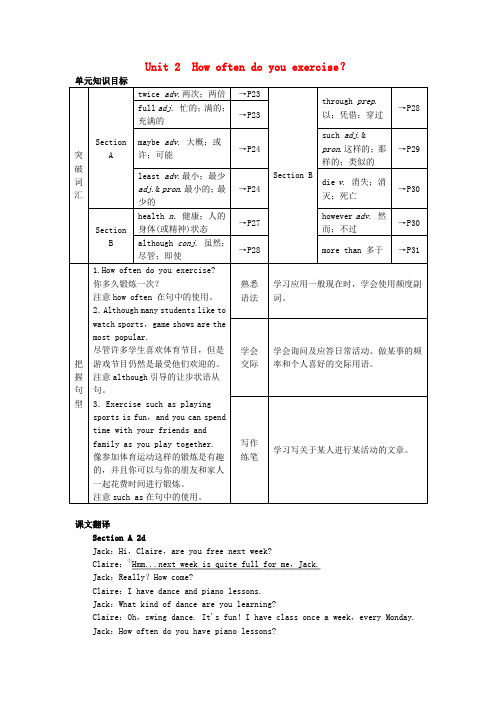
Unit 2 How often do you exercise?课文翻译Section A 2dJack:Hi,Claire,are you free next week?Claire:①Hmm...next week is quite full for me,Jack.Jack:Really?How come?Claire:I have dance and piano lessons.Jack:What kind of dance are you learning?Claire:Oh,swing dance. It's fun!I have class once a week,every Monday.Jack:How often do you have piano lessons?Claire:Twice a week,on Wednesday and Friday.Jack:Well,how about Tuesday?Claire:Oh,I have to play tennis with my friends.But do you want to come?Jack:Sure!,杰克:你好,克莱尔,下周你有空吗?克莱尔:呣……下周我很忙,杰克。
杰克:真的吗?怎么会那样?克莱尔:我上舞蹈课和钢琴课。
杰克:你学习的是什么舞蹈?克莱尔:噢,摇摆舞。
很有趣!我一周上一次课,每周一上课。
杰克:你多久上一次钢琴课?克莱尔:一周两次,在周三和周五。
杰克:噢,周二怎么样?克莱尔:哦,我要与朋友打网球。
你想来参加吗?杰克:当然了!知识详解1.How often do you exercise?你多久锻炼一次?【解读】本句是含有特殊疑问词how often 的特殊疑问句。
【解读】how often 多久一次,用于对动作发生的频率进行提问。
回答应该是频度副词或表示频率的词组,如always,usually,often,sometimes,hardly,ever,never,every day,once a week,three times a day等。
2013英语八年级上unit2_How_often_do_you_exercise单元课件

3c.What can you do to improve your English? Add more things to the chart. Then ask your classmates the questions and find the best English student.
How often do you…
2d.According to the article and the pie charts, write sentences
with the percentages using always, usually or sometime
1.90%:Ninety percent of the students always use the Internet. 2.85%:____________________________________________________ Eighty-five percent of the students watch TV every day.
1c.Listen to an interview about two people’s daily habits. Circle your answer to each question.
Does Tina have good habits? Yes.
Does Bill have good habits? Yes.
A:What’s your favorite program? B:Animal World.
A:How often do you watch it?
B:Twice a week.
2d.Role-play the conversation.
最新版 新目标 人教版 初二英语上《unit2_How_often_do_you_exercise》PPT课件以及练习题
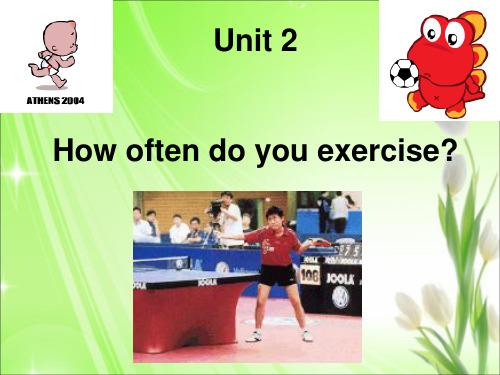
vegetables
tomatoes
potatoes
lettuce
broccoli
cabbage
卷心菜
carrots
meat
beef 牛肉
mutton 羊肉 chicken 鸡肉
food
bread
hnks
Are you healthy?
Do you often drink milk? Do you eat fruit and vegetables everyday? Do you often do your exercise?
exercise
根据句意及首字母写出单词.
wice 1. He watches TV t ________ a week. esult 2. Do you know the r ________ of the football match? ever 3. Mary n ______ eats hamburgers because she doesn’t like them.
shops
watches TV reads a book
He skateboards.
She surfs the Internet.
every day He does his homework every
day
A: How often do you do your homework? B: …..
A: How often……
plays football four times a month
goes to KFC
once a week
What do you usually do on weekends?
- 1、下载文档前请自行甄别文档内容的完整性,平台不提供额外的编辑、内容补充、找答案等附加服务。
- 2、"仅部分预览"的文档,不可在线预览部分如存在完整性等问题,可反馈申请退款(可完整预览的文档不适用该条件!)。
- 3、如文档侵犯您的权益,请联系客服反馈,我们会尽快为您处理(人工客服工作时间:9:00-18:30)。
1c
Pairwork
Talk about the people in the picture above. What do they do on weekends? A: What does she do on weekends? B: She often goes to the movies.
once a month 2013 twice a month three times a month· · ·
A: How often do you watch TV? B: I watch TV every day. A: What’s your favorite program? B: It’s Animal World. A: How often do you watch it? B: I watch it once a week.
疑问词 how often 是问频率 (多久一次),(在 这里助动词 do (does或did) 是起帮助构成疑 问的作用)与一般现在时或一般过去时连 用, 回答一般是用表示频率的副词。 如:once, twice, three times…, sometimes, quite, often, never, every day, once a week, twice a month, three times a month, three or four times a month 等。
Notes
本课时我们学习的主要语法点是由 wh- 和 how 引导的特殊疑问句以及对应的答语。 如: What do/does …? How often do/does …? 等。 What do you usually do on weekends? 你通常周末做什么? I usually listen to music. 我通常听音乐。
Section A
Period One
Read the words and expressions loudly.
Words preview
how often 多久一次 exercise v. & n. 锻炼;运动 skateboard v. 踩滑板;参加滑板运动 hardly adv. 几乎不;几乎没有 ever adv. 曾;曾经
go fishing
I always do some reading on weekends.来自always总是
usually
通常
often
常常
sometimes
有时
hardly ever
几乎不
never
从不
What does she usually do on weekends? She usually does homework.
different weekend activities.
1. skateboarding 2. ____________ reading 3. exercising ____________ 4. watching ____________ TV shopping 5. ____________
1b Listen and write the letters from the
How often do you go to the factory? 你多久去一次工厂? I go to the factory twice a week. 我两周去一次。 How often do you exercise? 你(你们)多久锻炼一次身体? How often + 助动词 do (does 或 did) + 主 语 + do sth.?
They usually go shopping.
What does he do on weekends?
often go skateboarding
sometimes surf the Internet
What do they do on weekends?
often go shopping
sometimes go swimming
go shopping
go skateboarding
read
surf
surf the Internet
do some cleaning
What do you usually do on weekends? I usually …
watch TV do homework play football
Boy 1: I ________exercise. usually Girl 1: I ______ always go shopping. Boy 2: I ______ never go shopping. often go skateboarding. Girl 2: I ______ sometimes Boy 2: And I __________watch TV. Girl 3: I _______ever watch TV. I love hardly reading.
Words preview adv. 一次 adv. 两次 n. 次;次数 v. 在……冲浪; 在激浪上驾 (船) Internet n. 网络;互联网 program n. 节目;表演 once twice time surf
What do you usually do on weekends? I usually …
课时重点回顾 - What do you usually do on weekends? - I usually play soccer. - What do they do on weekends? Grammar - They often go to the movies. Focus - What does he do on weekends? - He sometimes watches TV. - How often do you shop? - I shop once a month. - How often does Cheng watch TV? - He watches TV twice a week.
She often does some reading.
What _____he does usually do on weekends? He usually does some exercise.
He usually plays football.
do they usually do on weekends? What___ They often go to the movies.
What do they do on weekends?
usually
hardly ever
What does she do on weekends?
hardly ever
often
What does he do on weekends?
sometimes
never
1a Look at the picture. Make a list of the
picture above on the lines below.
a usually __ c always 100% __
often __ e
sometimes __ d hardly ever __ a d never 0% __
What do they usually do on weekends? Listen again and fill in the blanks.
请对下面句子划线部分提问。 1. He usually visits his grandpa every winter. What does he usually do every winter?
2. I visit my grandparents twice a year.
How often do you visit your grandparents?
2b Listen again. How often does Cheng do
the activities? Match his activities with the number of times he does them.
Activities a. go to the movies b. watch TV c. shop d. exercise e. read
How often every day once a week twice a week three times a week once a month twice a month
2c
Pairwork
How often do you do these activities? Fill in the chart and then make conversations.
2a Listen. Cheng is talking about how often
he does different activities. Number the activities you hear.
Activities 3 go to the movies a. __ b. __ 1 watch TV 5 shop c. __ 4 exercise d. __ e. __ 2 read
Homework
Write a short passage about how often you do different activities in 2a.
